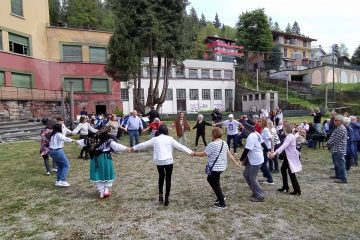Best wishes to Senator Liliana Segre on her 90th birthday from ANED – National Association of ex-deportees to Nazi camps which produced a special video to express her deep gratitude for her testimony.
The friends of the Children of Selvino join in these touching wishes with the utmost esteem and deference for Liliana Segre, an example for all of us against all forms of hatred and racism.
The crime of indifference
(by Lia Tagliacozzo from “Il manifesto” of 10.09.2020)
His speech to the high school students of the Canton of Ticino collected in the book «Always choose life» (Publisher Casagrande). The 90 years of the senator for life, a survivor of the Shoah, a witness to the challenges of the past as well as the present. In 1943, Switzerland rejected her, her father and two cousins. From Auschwitz she will return by herself. After the racial laws, at school, he was not subjected to violence or insults, but «I became invisible».
 The testimony of Senator Liliana Segre to the high school students of the Canton of Ticino dates back to before the covid and, to celebrate their ninety years – it turns them today – the Casagrande publishing house has published the long speech with the title «Always choose life – My story told to children» (pp. 92, euro 12). The text retains all the apparent simplicity and linearity of the language of the Holocaust survivor. Plain words, which follow one another essential, with no escape for the reader-listener. Giulio Cavalli, in the preface to the text, writes «of a lexical as well as intellectual ecology to which we are completely unaccustomed and which is the modus from which to start over in order to face the fading of a historical period».
The testimony of Senator Liliana Segre to the high school students of the Canton of Ticino dates back to before the covid and, to celebrate their ninety years – it turns them today – the Casagrande publishing house has published the long speech with the title «Always choose life – My story told to children» (pp. 92, euro 12). The text retains all the apparent simplicity and linearity of the language of the Holocaust survivor. Plain words, which follow one another essential, with no escape for the reader-listener. Giulio Cavalli, in the preface to the text, writes «of a lexical as well as intellectual ecology to which we are completely unaccustomed and which is the modus from which to start over in order to face the fading of a historical period».
A long story with clear language, never banal and with measured words. «I have not always been an eighty-eight-year-old woman – is the debut – I too was a child, a girl». An initial emotional gap in which Liliana Segre places herself at the same age as her listeners, an identification that marks the whole long testimony: she and the high school kids are thus immediately made equal in the face of the story that follows.
A TESTIMONY, that of Segre, which took place on a particular occasion: on December 3, 2018 just before the Senator spoke, Manuele Bertoli, head of the Canton’s Department of Education, Culture and Sport, publicly apologized for the first time in seventy-five years, of the behavior of the border guards who, on December 8, 1943, rejected her, her father and two cousins fleeing Nazi-fascist persecutions at the border. On their return to Italy, the four were arrested and then deported to Auschwitz, the extermination camp in Polish territory which has now become the symbol of the entire Nazi concentration complex for the execution of Jews, gypsies, homosexuals and political opponents during the Second World War. Only Liliana survived.
Apologies, those of Bertoli, which can be imagined also addressed to the other 24 thousand people – Jews and non-Jews – who, according to the independent commission of experts chaired by historian Jean-François Bergier, Switzerland rejected at the border.
On the day of the meeting in Lugano, at the entrance of Liliana Segre, the boys stood up applauding: a gesture of homage and sympathy that marked the whole story. A gesture that discards and counteracts the insults and threats that – for the shame of the whole of Italy – have forced the Senator for a year, for the sole fact of being the public voice of the tragedy of Nazi-fascism to have the escort of the police .
IN THE Witness BOOK, the story follows the unfolding of events: «Towards the end of the summer of 1938 (with the promulgation of the anti-Jewish racist laws) the news arrived that I would no longer be able to go to school – explains Liliana Segre – at the public school I attended as a child. I remember those words: “Expelled”, “You have been expelled”. It is terrible to be told at the age of eight that you have been expelled from school: you have done nothing and you think you are an ordinary child, a child that is neither good nor bad, one of many, equal to the others. But I was not the same as the others: I was the only one in the class who could no longer go to school; I was the only one who was “pointed out”: (…) I passed by my old school and they pointed to me with their finger: “That’s Segre and she can’t come to school anymore because she’s Jewish”».
Segre condenses in simple and understandable words one of the knots of those years of persecution: «I did not suffer violent acts from the others, I did not receive insults or insults: I simply became invisible. There is a cruel game that younger children sometimes play, a game that consists in pretending that a child who for some reason is considered boring no longer exists, and then you stop looking at it; even if that child says “But I’m here!”, the others pretend not to see him. This is how I felt: a completely invisible child, if it weren’t for three or four companions».
The discriminatory process that took place between 1938 and 1943, in the period of the persecution of rights, and also in the period after September 8, when Jews risked deportation and life, did not happen in a vacuum: just as Segre recounts there was an entire fabric of professional and friendly relationships, of proximity to life and neighborhood that measured itself against the racial laws, whose minute daily behaviors marked life and, at times, the difference between life and death. «That was a crucial historical moment – continues Liliana Segre – It was a matter of making a choice and we began to see people who did not make a choice. Choosing, on the other hand, is always important, even when we are faced with something that seems irrelevant to us: sometimes it can be a heroic choice, sometimes a choice without consequences. Most people didn’t make the choice back then. Not just my classmates, but all Italians».
THE QUESTION of choice innervates the whole story of the ex deported: when she describes the behavior in the extermination camp, when she tells of the possibility of shooting one of the torturers of the camp. The ability to choose is often there even in unimaginable situations. But the story unfolds in a flat and linear way and, returning to ’38, Segre continues: «They were happy, they went to the square to applaud: there was someone who thought for them. This, guys, is very dangerous, because when there are so many problems and an economic crisis, there is always someone who raises their voice and says “I’ll take care of it”, and all in all people are happy, because democratic life requires more commitment from everyone. This is exactly what happened: in Fascist Italy, very few made the choice».
Simple words that give everyone back the possibility of free action that is both political and ethical: «You are more happy with the winners – he continues – the chariot of the winner, whether he is a star, a footballer is always followed by crowds who applaud ; in front of the losers, however, the poor, the sick, those who fall into disgrace, there is always someone who says: “Well, there will be a reason if they are in that situation. What does it matter to me?”».
Liliana Segre HAS NO UNCERTAINTIES in continuously weaving threads that from the past, from the days of the death march that forced thousands of human beings without clothes and without food to march for 700 kilometers, reach the present determined: «Guys, never say that you can’t stand it anymore and don’t always blame others for what happens to you (…) That march was very hard, it was a test of strength with yourself, it was the desire not to die. I repeat to you guys: we humans are very strong, so in life put one leg in front of the other and you will see that in the end there is always something waiting for you». Threads that flap in the most pressing topicality even in the answers to the questions of the boys: «If one hasn’t experienced hunger, if he hasn’t known it in his horror, if he hasn’t grazed as I did in the dunghill to look for a bone already stripped, a piece of rotten cabbage or raw potato skins – raw potatoes are terrible – if one hasn’t felt hunger, one might say: “Those people will be hungry, but they’ll have something to eat”. No: when you are hungry, the real one, you cross the sea, climb a mountain, do anything, because hunger devours you, it no longer makes you think, it takes away your strength, it takes away your dignity, it takes away everything ».
The volume ends with a long interview by Bruno Boccaletti, in charge of the cultural study of the Italian-speaking Swiss Radio and Television.
LANGUAGE AND COMMITMENT – AFTER THE SILENCE, FIND THE WORDS AND BEAR THE IMPACT OF PAIN
«My language is of absolute simplicity, I speak to school children with the same words I speak to my grandchildren»: with a few words and a smile at the bottom of her voice, Senator Liliana Segre comments on the new book. Words and silences alternated throughout her long life, there were years in which talking and telling her own experience as a survivor of the Auschwitz extermination camp was impossible: «But with my grandchildren I am a grandmother and even now that I am telling my story in public with them I talk about life. My children, on the other hand, were born when silence still reigned».
As with other Holocaust survivors, it took a long time to find the words and to withstand the impact of the pain of telling and sharing memories.
It was around the age of sixty that Liliana Segre communicated to her family, without asking for permission, which she would begin to testify, an inner and firm response to the worm of not having yet «done one’s duty». Like so many others, such as for Piero Terracina and as for Franco Schoenheit, the taking of the word became painful and obligatory at a certain point.
Liliana Segre, strong in her public role not only as a witness but also as a senator, has determinedly woven links between the past and the present.
A few months ago, the “Extraordinary Commission of the Senate for combating the phenomena of intolerance, racism, anti-Semitism and incitement to hatred” was established. Approved by the classroom with 151 votes in favor and 98 abstentions, the commission was blocked by the onset of the pandemic: «It is still early to go into details – explains Segre – there has been a setback and there are still some steps but we will resume wires, we will begin to work and we will talk about it».


